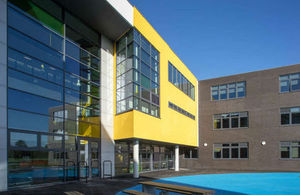Run-down schools in England get £160 million facelift
22 schools re-open under the government’s Priority School Building Programme (PSBP).

More than 11,500 pupils across the country start the school year in state-of-the-art new buildings thanks to multi-million pound refurbishment work, Schools Minister Lord Nash announced today (5 September 2015).
As part of the biggest wave to date, 22 schools are set to re-open this month under the Government’s flagship Priority School Building Programme (PSBP). The programme is part of a continued drive to ensure that pupils, regardless of birth or background, have access to excellent schools.
The PSBP sets out to address the individual needs of schools in the worst physical condition in the country, transforming them so pupils and teachers benefit from improved facilities including world class classrooms, multi-purpose halls and state of the art drama studios.
Before this September, 27 schools had already reopened under the first phase of PSBP, and this term a further 22 will reopen as a result of more than £160 million investment. Over the 2 phases of the PSBP, 537 schools will be transformed in projects worth a total of £4.4 billion.
Schools Minister Lord Nash said:
As part of this one nation government’s commitment to social justice we are ensuring every child, regardless of background, has access to world class schools.
The start of this new school year marks an important milestone in the progress of the Priority School Building Programme, with more schools than ever transformed from run-down buildings to state-of-the-art facilities.
These schools will give young people across the country the modern learning environment they need to unlock their potential.
Among the schools opening in September is the Thomas Gainsborough School in Suffolk. The school has a rich tradition in art and the top-storey art rooms with a terrace overlooking the Suffolk countryside provide stunning views to inspire pupils and enhance learning.
Headteacher Wayne Lloyd said:
We are delighted with our new school building. The students and the local community are very excited, they feel valued and privileged to be given such a wonderful new learning environment and I know these excellent facilities will ensure that educational standards continue to rise in this community.
At Haytor View Primary School in Devon, the £3 million rebuild includes a ‘welcoming hub’ for the school community and landscaping to provide external play space for pupils.
Headteacher Kate Liley said:
Children and parents have eagerly awaited the arrival of the new school, welcoming the opportunity to visit the site on a fortnightly basis and view progress.
The children have benefited from the opportunities set up with the contractor to develop their understanding of the development of the project and the building industry more widely, and parents have valued the opportunity to meet with the site supervisor at community events. Such opportunities have enabled the community to develop their engagement with the process.
Thanks to the PSBP, school buildings are being rebuilt faster and cheaper than those built under the previous school building initiative - Building Schools for the Future (BSF). Under BSF it took 3 years for construction work to begin. This was slashed to 1 year for the PSBP, with projects costing around a third less.
Notes to editors
-
The PSBP was established in 2011. A total of 260 schools have successfully applied for refurbishment work through the first phase of the programme.
-
Thanks to decisions which have been taken to improve efficiency and reduce waste in central school building programmes, significant work on those projects is already underway. There are currently 27 buildings which have been re-opened through the first phase of PSBP. By September 18, that figure will have risen to 49.
-
In May 2014 the government announced a further £2 billion for the second phase of the programme. A list of the 277 schools to benefit from the second phase of the PSBP was published on 9 February 2015.
DfE media enquiries
Central newsdesk - for journalists 020 7783 8300